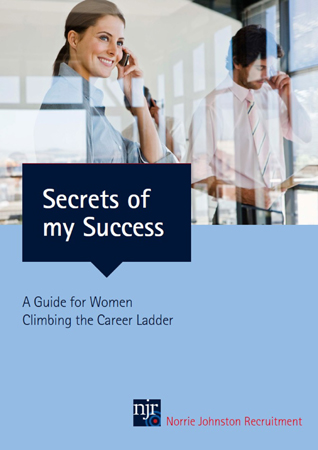NOT SO GREAT EXPECTATIONS
Published by Gbaf News
Posted on December 1, 2015
5 min readLast updated: January 22, 2026

Published by Gbaf News
Posted on December 1, 2015
5 min readLast updated: January 22, 2026

Inequality and the gender pay gap have hit the headlines in recent months with female representation on boards, the ‘glass ceiling’ and pay differentials all being at the forefront of this discussion. This was further highlighted in research carried out by Norrie Johnston Recruitment, which found that women in finance, as well as other industries, have much lower salary expectations than their male counterparts.

Secrets of my success
The recruitment firm asked male and female senior executives on its database, looking for permanent and interim senior roles, to disclose their average salary expectations and the results returned some significant differences.
A female Finance or Chief Finance Officer expects over £26,000 less than a man in the same role; a 25.8% differential. This was the largest gap of all the roles studied and was only exceeded by Non-Executive Directors where the gap between men and women is 51.3%.
Positions in IT (0.4%) and Customer Services (2.7%) present the smallest gap whilst women in Marketing are the exception to the rule, expecting marginally more money than their male counterparts.
With the exception of those in marketing roles, all women surveyed expected a lower salary.
| Norrie Johnston Recruitment Average Salary Expectations for Senior Candidates | |||
| Job Discipline | Men | Women | % Difference |
| Non Exec/NED | £118,333 | £70,000 | 51.3% |
| Finance/CFO | £114,985 | £88,571 | 25.8% |
| Change Management | £125,327 | £101,892 | 20.0% |
| Supply Chain/Procurement | £120,000 | £100,000 | 18.1% |
| Property/ Facilities | £115,714 | £100,000 | 14.5% |
| HR | £106,667 | £99,024 | 7.4% |
| Customer Services | £89,048 | £86,667 | 2.7% |
| MD/CEO/GM | £127,734 | £124,375 | 2.6% |
| Marketing | £109,091 | £110,889 | 1.6% |
| IT Project/Programme Management | £118,629 | £118,125 | 0.4% |
Senior candidates on Norrie Johnston Recruitment’s database were asked for their average salary expectations. Their responses suggest that in like for like positions, female candidates have a lower salary expectation than men.
Following the research, Norrie Johnston Recruitment asked ten highly successful business women to consider why they think the gender pay gap is still an issue, 45 years on from the introduction of Equal Pay, and to share the secrets of their career success.
Confidence and Money
Some suggested that a lack of confidence is a contributor to the issue. Dr Sue Black, award-winning computer scientist and tech sector figure head, believes women are often shy about saying what they are good at. “Putting what you are good at on your CV is not showing off. Before a job interview women should also find someone to give them a pep talk and tell them how great they are. It really does make a difference. Find those people who will make you feel good about yourself.”
She believes that this lack of confidence extends to money and urges women to aim high when in salary negotiations, otherwise the problem will only be heightened over time. “For some jobs – typically experienced-hire positions – women will be asked about their salary expectations. They should find out what a typical salary would be for the job in question, then ask for 10% more. This is particularly important when starting a career – the difference of a few thousand when you’re 21 can turn into 20, 30 or 40 thousand difference later in your career.”
Miriam Stoppard, famous doctor, author, television presenter and advice columnist, believes that more women need to have the confidence to insist on fair judgement when entering into negotiations with employers, she comments: “women should insist on being judged according to the same criteria as men and being rewarded in the same way and on the same scale. They should not work for any person who deviates from this and if necessary should leave an organisation that doesn’t see women equally with men and find one that does.”
A Numbers Game
There is a theory that the pay differential is being exacerbated by a lack of senior female representation in certain sectors/roles. The research conducted by Norrie Johnston Recruitment appears to bear this out as it suggests that where there is a higher representation of women in a role, the pay differential narrows, or in fact reverses. For example, marketing and HR are well established female career paths with the research showing that women in marketing in fact, have a higher salary expectation than men whilst in HR there was only a 7% differential.
Interestingly, mindful of this issue the government has launched a careers service aiming to show schoolgirls that no career is off limits. They plan to encourage young girls to aspire towards higher paid careers down non-traditional routes, such as engineering.
Planning Ahead
Others believe that the issue, of pay differential can be avoided if women career plan early on; Roberta Jacobs, who has 20 years director-level experience working in a range of companies including American Express, feels women should not leave things to chance and need to almost future-proof their careers. She believes women need to plan their career, having achievable and firm goals in mind. She says “women should plan backwards: this means, take time, frequently, ideally daily, to imagine your life and career from ‘the end’ working backwards to where you are. Then move forward”
Be Yourself
Finally, there is a school of thought that some women feel they need to mimic their male counterpart’s behaviour as they believe these management styles are the answer to achieving the higher salaries. This potentially leads to senior women down playing their own skills and capabilities. Miriam Stoppard encourages women to be themselves: “Don’t try to emulate their way of working or managing. Women, if anything, are better managers than men and certainly better at managing people. The female way of working is equally successful to the way a man works, so do things in your own way, in your own style”.
The views of ten successful business women, including the ones mentioned in this article, can be found in a guide entitled The Secrets of My Success. To get a copy visit: http://www.norriejohnstonrecruitment.com/downloads/.
Explore more articles in the Business category











